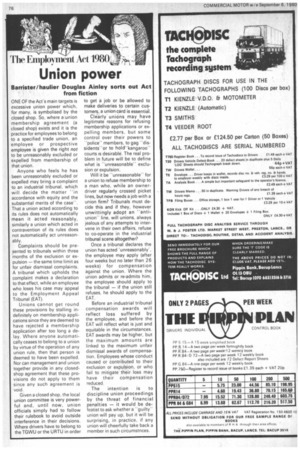Union power
Page 78

If you've noticed an error in this article please click here to report it so we can fix it.
Barrister/haulier Douglas Ainley sorts out Act from fiction ONE OF the Act's main targets is excessive union power which, for many, is symbolised by the closed shop. So, where a union membership agreement (a closed shop) exists and it is the practice for employees to belong to a specified trade union, an employee or prospective employee is given the right not to be unreasonably excluded or expelled from membership of that union.
Anyone who feels he has been unreasonably excluded or expelled may bring a complaint to an industrial tribunal, which will decide the matter "in accordance with equity and the substantial merits of the case". That a union acted according to its rules does not automatically mean it acted reasonably, similarly a union which acted in contravention of its rules does not automatically act unreasonably.
Complaints should be presented to tribunals within three months of the exclusion or expulsion -the same time limit as for unfair dismissal complaints. A tribunal which upholds the complaint makes a declaration to that effect, while an employee who loses his case may appeal to the Employment Appeal Tribunal (EAT).
Unions cannot get round these provisions by stalling indefinitely on membership applications since they are deemed to have rejected a membership application after too long a delay. Where anyone automatically ceases to belong to a union by virtue of the operation of any union rule, then that person is deemed to have been expelled. Nor can management and union together provide in any closedshop agreement that these provisions do not apply to them since any such agreement is void.
Given a closed shop, the local union committee is very powerful and, until now, union officials simply had to follow their rulebook to avoid outside interference in their decisions. Where drivers have to belong to the TGWU or the URTU in order to get a job or be allowed to make deliveries to certain customers, a union card is essential.
Clearly unions may have legitimate reasons for refusing membership applications or expelling members, but some control over their powers to "police" members, to gag "dissidents-or to hold' kangaroo" courts is desirable. The real problem in future will be to define what is "unreasonableexclusion or expulsion.
VVill it be "unreasonable" for a union to refuse membership to a man who, while an ownerdriver regularly crossed picket lines, but now needs a job with a union firm? Tribunals must decide this and if they, however unwittingly adopt an "antiunionline, will unions, always jealous of any attempts to intervene in their own affairs, refuse to co-operate in the industrial tribunal scene altogether?
Once a tribunal declares the union has acted 'unreasonably', the employee may apply (after four weeks but no later than 26 weeks) for compensation against the union. Where the union admits or re-admits him, the employee should apply to the tribunal if the union still refuses, he should apply to the EAT.
Before an industrial tribunal compensation awards will reflect loss suffered by the employee, and before the EAT will reflect what is just and equitable in the circumstances. EAT awards may be higher, but the maximum amounts are linked to the maximum unfair dismissal awards of compensation. Employees whose conduct caused or contributed to their exclusion or expulsion, or who fail to mitigate their loss may have their compensation reduced The intention is to discipline union proceedings by the threat of financial penalties it would be defeatist to ask whether a ''guilty'' unionwill pay up, but it will be surprising, in practice, if any union will cheerfully take back a member in such cireumstnces.




































































































































